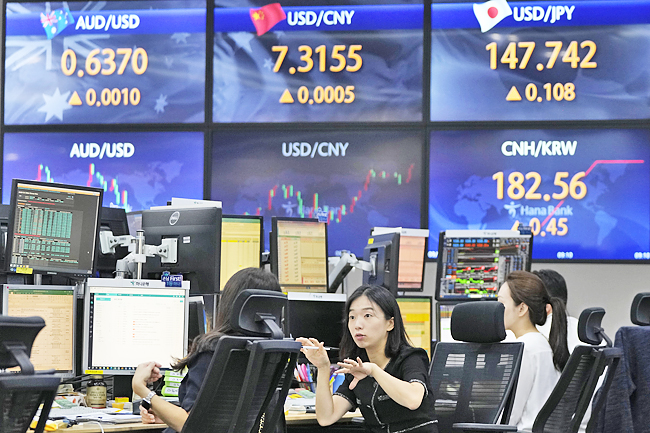AP – World shares slipped yesterday after China reported that its exports fell for a fourth straight month in August, adding to pressures on its slowing economy.
Oil prices and US futures also fell.
Germany’s DAX lost 0.2 per cent to 15,718.12. In London, the FTSE 100 edged 0.1 per cent lower, to 7419.42. The CAC 40 in Paris gained two points to 7,196.75.
The future for the S&P 500 was down 0.4 per cent while that for the Dow Jones Industrial Average lost 0.1 per cent.
China said its exports fell 8.8 per cent in August from a year earlier, while imports were down 7.3 per cent. The declines were smaller than the double-digit drops in July, however, and were better than most forecasts.
Hong Kong’s Hang Seng, which has yoyoed this week on news about possible policy changes for China’s troubled property sector, declined on selling of tech shares. It fell 1.3 per cent to 18,202.07.
The Shanghai Composite index lost 1.1 per cent to 3,122.35, while Tokyo’s Nikkei 225 shed 0.8 per cent to 32,991.08.

In Seoul, the Kospi sank 0.6 per cent to 2,548.26. Australia’s S&P/ASX 200 was off 1.2 per cent at 7,171.00.
Shares in most other regional markets fell.
On Wednesday, the S&P 500 dropped 0.7 per cent and the Dow industrials shed 0.6 per cent.
The Nasdaq gave back 1.1 per cent.
Big technology stocks were among the biggest drags on the market. Apple fell 3.6 per cent and Nvidia dropped 3.1 per cent.
But several companies made big moves after reporting earnings and other updates.
AeroVironment jumped 20.7 per cent after the maker of unmanned aircrafts raised its sales forecast for the year. Roku rose 2.9 per cent after giving investors an encouraging financial update and saying it would cut 10 per cent of its staff.
The dominant economic theme remains inflation and interest rates, which the Fed has boosted in an effort to bring down prices. Investors have been hoping that the Fed might moderate interest rate increases going forward as inflation has been easing for months.
Treasury yields climbed following data showing the US services sector remains strong, and when bond yields shoot higher, investors tend to reconsider whether stocks are too expensive.
The Institute for Supply Management’s latest survey showed that the sector, which employs most Americans, grew at a faster pace than economists expected in August. It has remained resilient throughout 2023 despite persistent inflation and rising interest rates squeezing consumers.
“Paradoxically, however, what’s good news for the economy is bad news for markets,” Stephen Innes of SPI Asset Management said in a commentary. “Currently, we are seeing the downside risk associated with positive growth news, especially when paired with investors fretting about the possible persistent inflationary impacts of higher oil prices.”
Wall Street expects the Fed to hold its benchmark interest rate steady at its next meeting later in September.
Investors are mostly betting that the central bank will maintain that pause through the rest of the year. Economic updates last week on consumer confidence, jobs and inflation had reinforced those hopes.
Inflation has been easing for months under the weight of the Fed’s aggressive rate hikes that started in 2022 and brought its main interest rate to the highest level since 2001.
The policy raised concerns that the central bank might be too aggressive and hit the brakes on economic growth with enough force that the economy would be thrown into a recession.
A strong jobs market and consumer spending have propped up the broader economy and staved off a recession, so far. Wall Street will get several more economic updates on inflation and retail sales later in September ahead of the Fed’s next meeting.
In other trading yesterday, US benchmark crude oil was down USD0.59 at USD86.95 a barrel in electronic trading on the New York Mercantile Exchange. It gained USD0.85 on Wednesday.
Brent crude, the pricing basis for international trading, was down USD0.48 at USD90.12 a barrel.
The US dollar fell to JPY147.42 from JPY147.66 on Wednesday. The euro edged down to USD1.0713 from USD1.0725.


